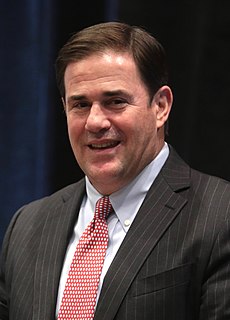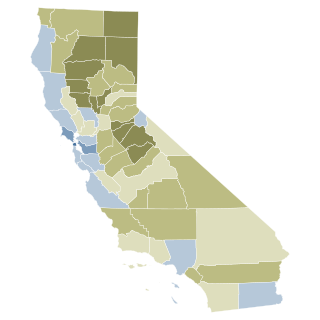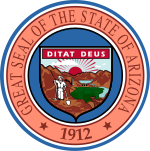
Proposition 13 is an amendment of the Constitution of California enacted during 1978, by means of the initiative process. The initiative was approved by California voters on June 6, 1978. It was upheld as constitutional by the United States Supreme Court in the case of Nordlinger v. Hahn, 505 U.S. 1 (1992). Proposition 13 is embodied in Article XIII A of the Constitution of the State of California.

Janice Kay Brewer is an American politician and author who was the 22nd governor of Arizona from 2009 to 2015. A member of the Republican Party, Brewer is the fourth woman to be Governor of Arizona. Brewer assumed the governorship as part of the line of succession, as determined by the Arizona Constitution, when Governor Janet Napolitano resigned to become U.S. Secretary of Homeland Security. Brewer had been Secretary of State of Arizona from January 2003 to January 2009.

California Proposition 91 was a failed proposal to amend the California Constitution to prohibit motor vehicle fuel sales taxes that are earmarked for transportation purposes from being retained in the state's general fund. The proposition appeared on the ballot of the February primary election.

California's state elections were held November 3, 1992. Necessary primary elections were held on March 3. Up for election were all the seats of the State Assembly, 20 seats of the State Senate, and fifteen ballot measures.

Arizona Proposition 102 was an amendment to the constitution of the state of Arizona adopted by a ballot measure held in 2008. It added Article 30 of the Arizona Constitution, which says: "Only a union of one man and one woman shall be valid or recognized as a marriage in this state." The amendment added a constitutional ban on same-sex marriage to existing statutory bans in place since 1996. In October 2014, Article 30 of the Arizona Constitution was struck down as unconstitutional in the United States District Court for the District of Arizona, and is no longer enforced by the state of Arizona, which now allows and recognizes same-sex marriages.

Proposition 227 was a California ballot proposition passed on the June 2, 1998, ballot. Proposition 227 was repealed by Proposition 58 on November 8, 2016.

The 2010 Arizona state elections were held on November 2, 2010, with primaries on August 24, 2010. These include gubernatorial and both sides of Congress. A special election was also on May 18 for Proposition 100.

Proposition 203, or the Arizona Medical Marijuana Act, was an Arizona ballot measure to legalize the use of medical marijuana without the normal Food and Drug Administration testing for safety and efficacy. Proposition 203 passed by a narrow margin, with 50.13% of the vote.

The California state elections was held on Election Day, November 6, 2012. On the ballot were eleven propositions, various parties' nominees for the United States presidency, the Class I Senator to the United States Senate, all of California's seats to the House of Representatives, all of the seats of the State Assembly, and all odd-numbered seats of the State Senate.

Douglas Anthony Ducey is an American businessman and politician serving as the 23rd governor of Arizona since 2015. A member of the Republican Party, Ducey was previously the CEO of Cold Stone Creamery, a chain of ice cream parlors.

California Proposition 19 was a ballot initiative on the November 2, 2010, statewide ballot. It was defeated, with 53.5% of California voters voting "No" and 46.5% voting "Yes." If passed, it would have legalized various marijuana-related activities, allowed local governments to regulate these activities, permitted local governments to impose and collect marijuana-related fees and taxes, and authorized various criminal and civil penalties. In March 2010, it qualified to be on the November statewide ballot. The proposition required a simple majority in order to pass, and would have taken effect the day after the election. Yes on 19 was the official advocacy group for the initiative and California Public Safety Institute: No On Proposition 19 was the official opposition group.

Proposition 29, the California Cancer Research Act, is a California ballot measure that was defeated by California voters at the statewide election on June 5, 2012.

Proposition 39 is a ballot initiative in the state of California that modifies the way out-of-state corporations calculate their income tax burdens. The proposition was approved by voters in the November 6 general election, with 61.1% voting in favor of it.

Proposition 30, officially titled Temporary Taxes to Fund Education, is a California ballot measure that was decided by California voters at the statewide election on November 6, 2012. The initiative is a measure to increase taxes to prevent US$6 billion cuts to the education budget for California state schools. The measure was approved by California voters by a margin of 55 to 45 percent.

2015 Michigan Proposal 1, also known as the Michigan Sales Tax Increase for Transportation Amendment, was a referendum held on May 5, 2015, concerning a legislatively-referred ballot measure. The measure's approval would have caused one constitutional amendment and 10 statutes to go into effect. It is estimated that Proposal 1 would raise state revenues from sales and use taxes by $1.427 billion, fuel taxes by $463 million, truck registration fees by $50 million, and vehicle registration fees by $10.1 million in the first year. If approved, the proposal was estimated by the Associated Press to result in an average tax increase of $545 per household in 2016.

Proposition 55 is a California ballot proposition that passed on the November 8, 2016 ballot, regarding extending by twelve years the temporary personal income tax increases enacted in 2012 on earnings over $250,000, with revenues allocated to K–12 schools, California Community Colleges, and, in certain years, healthcare. Proposition 55 will raise tax revenue by between $4 billion and $9 billion a year. Half of funds will go to schools and community colleges, up to $2 billion a year would go to Medi-Cal, and up to $1.5 billion will be saved and applied to debt.

Cannabis in Arizona is legal for recreational use. A 2020 initiative to legalize recreational use passed with 60% of the vote. Possession and cultivation of recreational cannabis became legal on November 30, 2020, with the first state-licensed sales occurring on January 22, 2021.

The California state elections in 2020 were held on Tuesday, November 3, 2020. Unlike previous election cycles, the primary elections were held on Super Tuesday, March 3, 2020.

California Proposition 15 was a failed citizen-initiated proposition on the November 3, 2020, ballot. It would have provided $6.5 billion to $11.5 billion in new funding for public schools, community colleges, and local government services by creating a "split roll" system that increased taxes on large commercial properties by assessing them at market value, without changing property taxes for small business owners or residential properties for homeowners or renters. The measure failed by a small margin of about four percentage points.

Arizona Proposition 207 was a voter initiative that appeared on the November 3, 2020, Arizona general election ballot to legalize cannabis for recreational use. Passing with 60% of the vote, the initiative legalized the possession of up to an ounce of cannabis, licensed sales at dispensaries, and personal cultivation of up to six plants. Along with Montana, New Jersey and South Dakota, Arizona is one of four states that legalized recreational marijuana via ballot measures in 2020.











